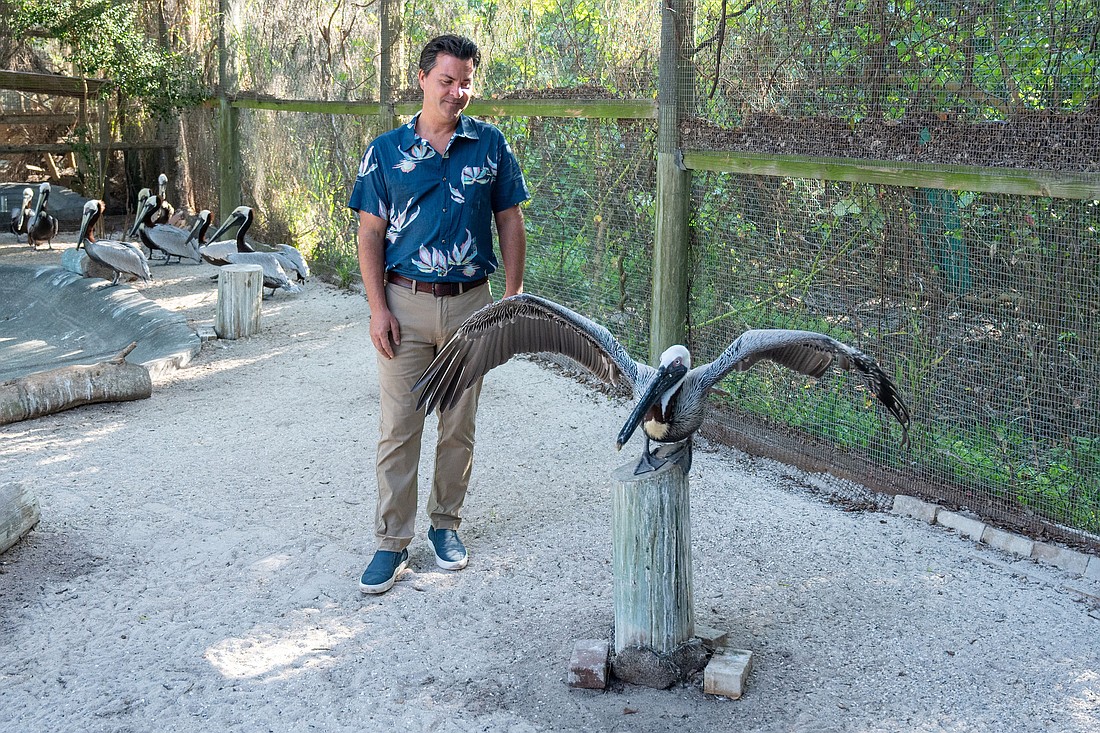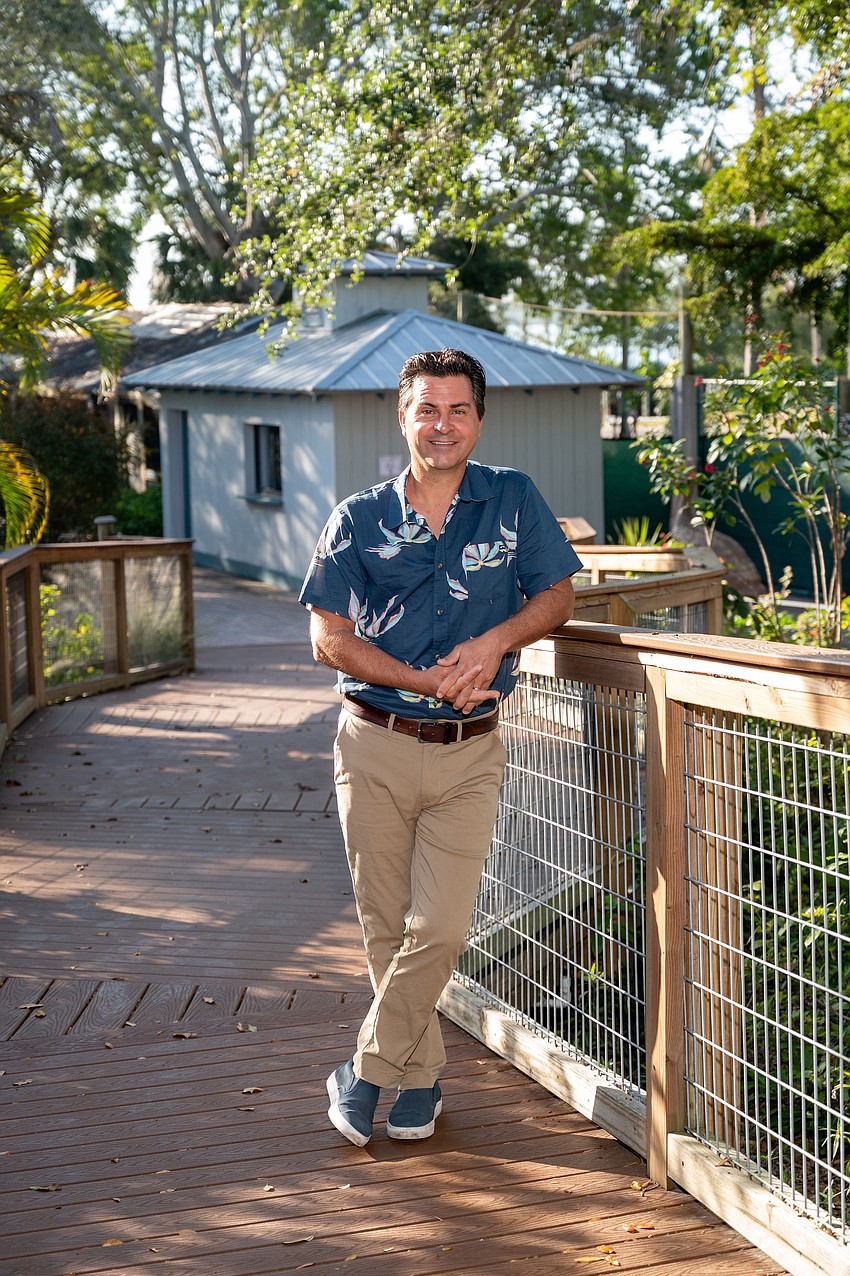- May 19, 2025
-
-
Loading

Loading

When Aaron Virgin came on board as CEO of Save Our Seabirds in summer 2021, the small attraction and avian rescue center on City Island had been closed to the public for 16 months due to the COVID-19 pandemic.
“My predecessor felt it wasn’t safe, even though it’s an outdoor facility,” Virgin says. “A lot of people I talked to were shocked that we were closed.”
By contrast, Mote Marine Laboratory & Aquarium — SOS’s much larger next-door neighbor — was shuttered for just two months. One of Virgin’s first priorities was to reopen the gates, which happened the first week into his tenure. And it came with a significant change: free admission.
“There was this real false impression that we were a part of the Mote property and by asking people to pay an extra $10 a lot of them would walk away,” Virgin explains. So, the facility set up a donation box in lieu of a ticket booth. The result? In 2022, 116,000 people came through to view the 120 resident birds — nearly twice the attendance of the last pre-pandemic year. The donations amounted to roughly $50,000, about 30% more than the pay model. “Not to mention the good will,” Virgin adds, “which is priceless, plus all the people who had never previously come through here.”
Free admission was just one early move in an ambitious program that signals a new future for SOS. The nonprofit was founded in 2008 on the site of the longstanding Pelican Man’s Bird Sanctuary, which closed two years prior due to lack of funding. The three-acre facility is well into replacing its aging aviaries — made of wood and wire mesh — with longer-lasting ones constructed of aluminum and coated nylon mesh that makes for better bird viewing.
Concurrently, the leadership plans to build a new bird hospital, with an X-ray machine and fully equipped operating room. SOS brought on its first full-time avian veterinarian, Dr. Maria Passarelli, in fall 2020. An updated and expanded hospital will allow her to perform more complicated surgeries.
The master plan also includes a new administration building and expanding the workforce. As of late February, SOS employed eight full-time staffers and has about two dozen volunteers, most of whom are on call to pick up injured birds and bring them to the rescue center.
Virgin has set 2026 for completing the nonprofit’s multipronged makeover.

The CEO, who prior to taking the helm at SOS was a philanthropic officer at Mote, knows that bringing in money is a priority on his to-do list. In 2021, the facility operated on a budget of $800,000. That figure will have to increase at least five-fold, Virgin says. He doesn’t sound concerned. “The great thing about Sarasota is there is a lot of wealth, and a lot of philanthropy and more dollars per capita than New York and Miami.”
SOS is currently in the non-public or “quiet” phase of a $15 million capital campaign. Virgin plans to use the first new aviary as a kind of “model home” to show off to potential donors. The CEO had his fundraising chops put to test last fall when Hurricane Ian caused $180,000 worth of damage, mostly to the aviaries. SOS resumed caring for birds after two days and was closed to the public for 27. Virgin and his board members raised $140,000 in 40 days, mostly via social media outreach and e-blasts. As of February, the repairs were completed and the cleanup nearly done.
As much as SOS is an inviting place for people to behold birds — from pelicans to parakeets — the facility’s primary business is helping to revive ailing ones. The expansion takes place at a time when birds face increasing danger from a fast-growing human population and accompanying development. According to Passarelli, the biggest threats to the feathered set in the Sarasota area are fishing hooks and line; collisions with boats and cars; orphaned babies; poison from red tide and other toxins; and attacks, often by cats.
Most of her work involves removing fish hooks, providing fluid and nutritional support, medications for infections and dressing wounds. A better equipped hospital would enable her to do surgeries for broken bones, internal hook removals and other more complex procedures.
Passarelli occasionally encounters cases that linger in her mind. Last summer, two baby chimney swifts, each weighing about 10 grams (think two nickels) had fallen out of a local chimney and arrived at SOS on the brink of death. Passarelli and her staff initiated a stabilization protocol — warming them up in an incubator, for starters. Once it was clear the birds were likely to survive, they had to be fed “every 20 to 30 minutes during the daytime,” Passarelli says. “That species mostly eats insects, but we also had to administer seven different vitamins and supplements.”
Staff members took turns bringing the birds home to care for them overnight. After six weeks, they were healthy enough to return to the wild. But there was a catch: To survive, the youngsters would need to be released into a colony of chimney swifts. A few blocks from the SOS compound lives a bird enthusiast who knew of such a colony near his home. He offered up his roof for the release.
An hour before dusk, a group of chimney swifts showed up and started flying around in circles. Virgin, Passarelli and the homeowner were on the roof waiting for them. Passarelli opened a box and the revived chimney swifts flew to meet their airborne comrades.
“It was such a beautiful moment,” she says, “to release these birds that had come in on death’s door.”